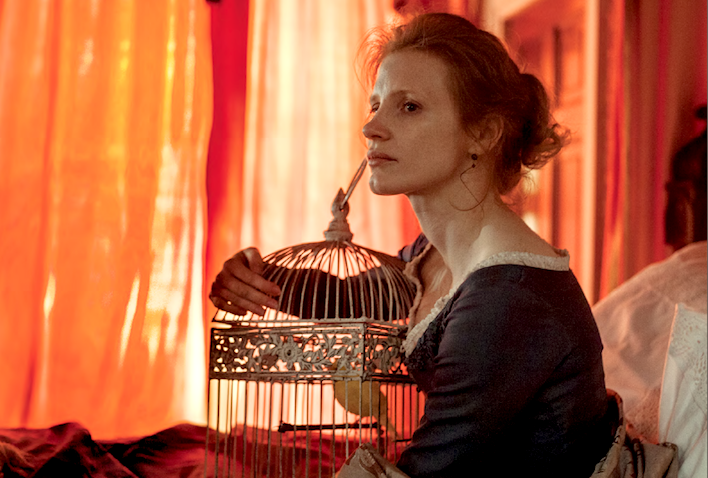 This is a reprint of our review from the 2014 Toronto International Film Festival.
This is a reprint of our review from the 2014 Toronto International Film Festival.
It’s taken close to 15 years for her to return to the director’s chair, followed by months of speculation once news of production hit, but Liv Ullmann finally unveiled her new film at the Toronto International Film Festival. “Miss Julie,” the infamous play by August Strindberg, adapted for the screen and stage in multiple countries and languages, gets an Anglophone interpretation from the legendary Norwegian actress. This version is set in Ireland and stars a trio of familiar faces: Jessica Chastain, Colin Farrell, and Samantha Morton. The film has all the makings of a special occasion: the return of Ullmann, the continuation of the "Chastainaissance," Colin Farrell in a respectable film again. It’s no surprise that we were swept up in all the excitement (the film was a shoe-in for our 15 most anticipated TIFF films), and yet, now that we’ve finally seen it, color us disenchanted.
Before the story commences, Ullmann treats us to a prologue that sees a young Miss Julie aimlessly wandering in the empty confines of her father’s castle. We see her calling out for her mother and walking by the brook where she sees one of her dolls stuck in a tree. She lets out a slightly sinister snicker at the sight of the abandoned doll, and returns to her vast mansion. We jump to Midsummer Night 1890, where the same castle is deserted, save for three individuals; Cathleen the maid (Morton), John the valet (Farrell), and Miss Julie, the baron’s daughter (Chastain). Cathleen and John immediately gossip about the lady of the house, specifically how she forced John to dance with her. The flirty dynamic between Cathleen and John suggests a familiarity that oversteps the boundaries of a working relationship, and John doesn’t fail to notice Cathleen’s jealous reaction. And then, Miss Julie enters. Her silky entrance from the shadows becomes one of the film’s instant highlights.

Cathleen takes her leave to look after Miss Julie’s suffering dog, while the young aristocrat, who appears to be in a mischievous sort of mood, traps John. “You are very strange,” John tells her, and she doesn’t pretend to deny it. “So are you. Life is strange.” The night grows stranger still, as master and servant continue to exchange impassioned monologues composed of lustful innuendoes and agonizing tension. At one moment, John confesses that he’s been in love with her since he first laid eyes on her as a child, and the next sees him in staunch denial, quick to remind her of their vastly different positions on the social ladder. She’s just as capricious, ordering him around like a slave, and then transforming into a damsel in distress. The back-and-forth continues, until libido overpowers them both and they end up in John’s bedroom. Be it a product of John’s uncontrollable instincts, or Julie’s need to be wanted, the sex comes with catastrophic implications and the tensions continue to ascend to a boiling point.

Do not be deceived by the film’s small scale and cast, because there is so much to take in here. Strindberg wrote a classic naturalistic play, allowing all three characters freedom to come alive and reveal dozens of dimensions to their personalities. Part of our disenchantment with Ullmann’s adaptation stems from an unflinching claustrophobia that seems to break through the celluloid to beat us into submission. This makes for an uncomfortable viewing experience, and it came as no surprise that the screening had plenty of walkouts. The general public likes to be entertained, and this film is clearly not in the business of entertaining. You will squirm, you will physically recoil, and you will fret in overwhelming anxiety. Much of this is due to Ullmann’s persistent medium shots of the actors, whose performances are ferocious. All three bite into their dialogue. Chastain’s accent is shakily inconsistent, Farrell’s knack for affected intensity is amped to the maximum, and Morton’s discomfort cracks under pressure.

And yet, there’s an undeniable animalistic fervor contained within “Miss Julie,” which reminds us that we are watching a masterful display of vile, dirty, and mercurial emotion. This is all pronounced via gorgeous aesthetics, such as Mikhail Krichman’s lighting shining on the actors’ faces as if brushstrokes in Victorian paintings. Ullmann’s use of Schubert and Bach is one of the most assured and revelatory utilizations of music we’ve heard in some time. As soon as the notes hit, the symbiosis of sound and picture is as undeniable as Jessica Chastain’s towering performance. For if we must single out one of the three, Chastain’s is the keeper. Shaky accent be damned, this is her most frightening, mature, and volcanic performance of an already resplendent career. Her turn in this film will go down as one of her greatest triumphs, but we also have Liv Ullmann to thank for it. Had it been anyone else directing, it’s likely that Chastain wouldn’t have gone to such depths. The actress credits her director for inspiration, calling it a “combined performance,” which binds the two in a sort of sisterhood.
As our thoughts on this film continue to settle, we can chalk up our decidedly strange impression to the evils of hype. Farrell’s intensity, Morton’s visible discomfort, Chastain’s accent, Ullmann’s inexorable medium shots, these flaws may all be discarded over time. Ullmann’s version of “Miss Julie” exists in a special cinematic category. It’s toxic, it’s hypnotic, and passionately translates Strindberg’s genius instinct for enlightening the multi-layered psychological spectrums of human desire for lust and power. It’s unforgettable in every sense of the word. [B+]

